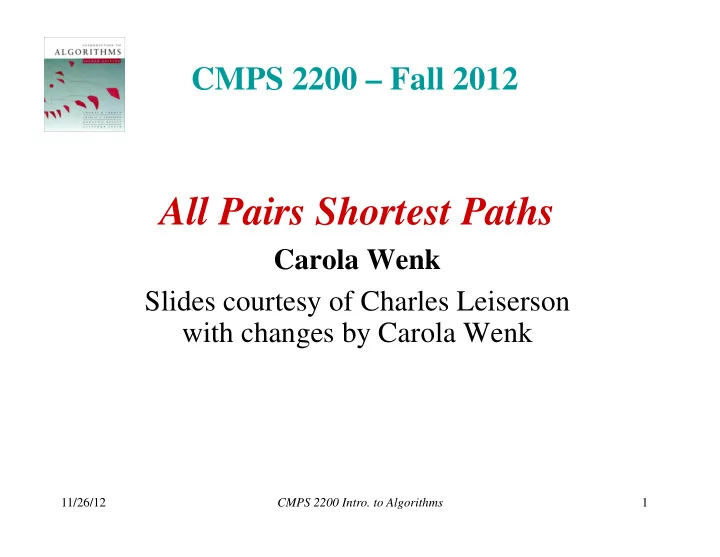

CMPS 2200 – Fall 2012 All Pairs Shortest Paths Carola Wenk Slides courtesy of Charles Leiserson y with changes by Carola Wenk 11/26/12 CMPS 2200 Intro. to Algorithms 1
Shortest paths p Single-source shortest paths • Nonnegative edge weights No egat ve edge we g ts • Dijkstra’s algorithm: O (| E| log | V| ) • General: Bellman-Ford: O (| V||E| ) • DAG: One pass of Bellman Ford: O (| V| + | E| ) • DAG: One pass of Bellman-Ford: O (| V| + | E| ) CMPS 2200 Intro. to Algorithms 2 11/26/12
Shortest paths p Single-source shortest paths • Nonnegative edge weights No egat ve edge we g ts • Dijkstra’s algorithm: O (| E| log | V| ) • General: Bellman-Ford: O (| V||E| ) • DAG: One pass of Bellman Ford: O (| V| + | E| ) • DAG: One pass of Bellman-Ford: O (| V| + | E| ) All-pairs shortest paths • Nonnegative edge weights No egat ve edge we g ts • Dijkstra’s algorithm | V | times: O (| V||E| log | V| ) • General • Bellman-Ford | V | times: O(| V| 2 | E| ) Bellman Ford | V | times: O(| V| | E| ) • Floyd-Warshall: O(| V| 3 ) CS 3343 Analysis of Algorithms 3 11/26/12
All-pairs shortest paths p p Input: Digraph G = ( V , E ), where | V | = n , with edge-weight function w : E → R . Output: n × n matrix of shortest-path lengths δ ( i j ) f δ ( i , j ) for all i , j ∈ V . ll i j V Algorithm #1: • Run Bellman-Ford once from each vertex. • Time = O(| V| 2 | E| ). • But: Dense graph ⇒ O(| V| 4 ) time. O(| V| 4 ) ti B t D h CS 3343 Analysis of Algorithms 4 11/26/12
Floyd-Warshall algorithm y g • Dynamic programming algorithm. • Assume V ={1, 2, …, n }, and assume G is given A V {1 2 } d G i i in an adjacency matrix A =( a ij ) 1 ≤ i,j ≤ n where a ij is the weight of the edge from i to j . the weight of the edge from i to j ( k ) = weight of a shortest path from i Define c ij to j with intermediate vertices to j with intermediate vertices belonging to the set {1, 2, …, k }. ≤ k ≤ k ≤ k ≤ k ≤ k ≤ k ≤ k ≤ k ≤ k ≤ k ≤ k ≤ k ≤ k ≤ k ≤ k ≤ k i i j j Thus δ ( i j ) = c ( n ) Also c (0) = a Thus, δ ( i , j ) = c ij ( n ) . Also, c ij (0) = a ij . CS 3343 Analysis of Algorithms 5 11/26/12
Floyd-Warshall recurrence y ( k ) = min { c ij ( k– 1) + c kj ( k– 1) , c ik ( k– 1) } c ij Use vertex k Do not use vertex k k ( k– 1) ( k ) ( k ( k– 1) ) c ik c c kj c i i i i j j ( k– 1) c ij intermediate vertices in {1 2 intermediate vertices in {1, 2, …, k -1} k 1} CS 3343 Analysis of Algorithms 6 11/26/12
Pseudocode for Floyd- Warshall Warshall for k ← 1 to n do for i ← 1 to n do for j ← 1 to n do if c ( k-1) > c ( k 1) > c ik (k-1) + c (k 1) + c kj (k-1) then (k 1) then if c ij relaxation ( k) ← c ik (k-1) + c kj (k-1) c ij else l (k) ← c ij (k-1) c ij • Runs in Θ ( n 3 ) time and space • Simple to code. p • Efficient in practice. CS 3343 Analysis of Algorithms 7 11/26/12
Shortest paths p Single-source shortest paths • Nonnegative edge weights No egat ve edge we g ts • Dijkstra’s algorithm: O (| E| log | V| ) • General: Bellman-Ford: O (| V||E| ) adj. list • DAG: One pass of Bellman Ford: O (| V| + | E| ) • DAG: One pass of Bellman-Ford: O (| V| + | E| ) All-pairs shortest paths adj. list j • Nonnegative edge weights No egat ve edge we g ts • Dijkstra’s algorithm | V | times: O (| V||E| log | V| ) • General adj. list j • Bellman-Ford | V | times: O(| V| 2 | E| ) Bellman Ford | V | times: O(| V| | E| ) adj. matrix • Floyd-Warshall: O(| V| 3 ) CS 3343 Analysis of Algorithms 8 11/26/12
Recommend
More recommend